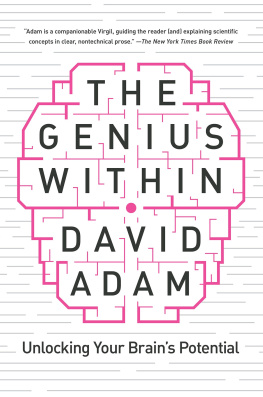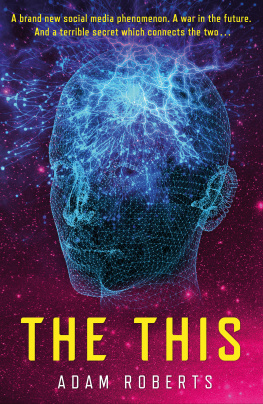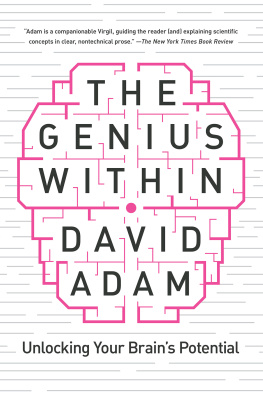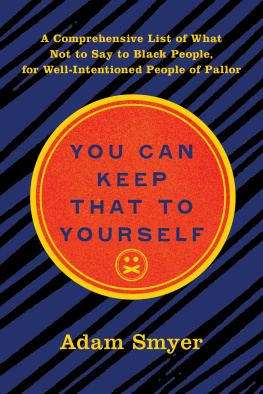David Adam [Adam - The Genius Within: Unlocking Your Brain’s Potential
Here you can read online David Adam [Adam - The Genius Within: Unlocking Your Brain’s Potential full text of the book (entire story) in english for free. Download pdf and epub, get meaning, cover and reviews about this ebook. year: 2018, publisher: Pegasus Books, genre: Religion. Description of the work, (preface) as well as reviews are available. Best literature library LitArk.com created for fans of good reading and offers a wide selection of genres:
Romance novel
Science fiction
Adventure
Detective
Science
History
Home and family
Prose
Art
Politics
Computer
Non-fiction
Religion
Business
Children
Humor
Choose a favorite category and find really read worthwhile books. Enjoy immersion in the world of imagination, feel the emotions of the characters or learn something new for yourself, make an fascinating discovery.
- Book:The Genius Within: Unlocking Your Brain’s Potential
- Author:
- Publisher:Pegasus Books
- Genre:
- Year:2018
- Rating:4 / 5
- Favourites:Add to favourites
- Your mark:
- 80
- 1
- 2
- 3
- 4
- 5
The Genius Within: Unlocking Your Brain’s Potential: summary, description and annotation
We offer to read an annotation, description, summary or preface (depends on what the author of the book "The Genius Within: Unlocking Your Brain’s Potential" wrote himself). If you haven't found the necessary information about the book — write in the comments, we will try to find it.
David Adam [Adam: author's other books
Who wrote The Genius Within: Unlocking Your Brain’s Potential? Find out the surname, the name of the author of the book and a list of all author's works by series.
The Genius Within: Unlocking Your Brain’s Potential — read online for free the complete book (whole text) full work
Below is the text of the book, divided by pages. System saving the place of the last page read, allows you to conveniently read the book "The Genius Within: Unlocking Your Brain’s Potential" online for free, without having to search again every time where you left off. Put a bookmark, and you can go to the page where you finished reading at any time.
Font size:
Interval:
Bookmark:
THE
GENIUS
WITHIN
Unlocking Your Brains Potential
DAVID ADAM

The idea was quite logical; a parasite and landowner naturally supposed that intelligence was a marketable commodity like everything else, and that in Switzerland especially it could be bought for money. The case was entrusted to a celebrated Swiss professor, and cost thousands of roubles; the treatment lasted five years. Needless to say, the idiot did not become intelligent, but it is alleged that he grew into something more or less resembling a man.
Fyodor Dostoyevsky, The Idiot
Your brain is capable of so much more. I know this because, although your brain is unique, it is nothing special. There are billions of brains just like yours. And in some of those brains the ones just like yours something extraordinary happens.
Something extraordinary happened to my brain, and thats why I am writing this book. The change opened my eyes to what is possible. My concentration improved, my memory sharpened, my cognitive skills expanded. I became a more fluent communicator and a more sympathetic listener. My productivity at work soared. My home life became happier and more content. And I did it all by finding and activating a part of my brain that had lain dormant for too long.
This part of my brain probably cant be pointed to on a scan. Its more a function of my mind, a door within my consciousness to which I was handed a key. For, despite what you might have heard, its not true that we only use 10 per cent or so of our brain, which leaves the rest untapped and rich with potential. Our brain cells are overloaded with work, so much so that most have several jobs to do. None are idle.
But its true that we only access a fraction of what that brain your brain could do. Most call it the mind, but you can name it spirit, awareness, consciousness, or the ghost in the machine, whatever term you like. What matters is that it can be altered. It is not much of the brains structure that lies unused, but much of the brains your brains function.
Mapping and understanding brain function and how it can be changed is a frontier of modern neuroscience, the defining discipline of this twenty-first century. And it comes down to connections. Just as the ancients imposed patterns and pictures onto the randomness of the stars, so the brain relies on circuits, sequences and constellations of activity to produce co-ordination and cognition from its billions of individual cells. From memories and mathematics to grief, insight and genius, all of it is formed from the way brain cells make and break links with their neighbours, and how they use these links to communicate. And heres the kicker: science now has the tools to manipulate and to strengthen those links on demand. Modern brain science is not just about observing any more. It can intervene, to change the way the brain and the mind works. To make it work better.
My brain was made to work better after I received therapy for mental illness. I had severe obsessive-compulsive disorder (OCD) that showed itself as a wildly exaggerated and irrational fear of HIV and Aids. I had a blind spot in my mental functioning that could not accept very small risks but only as applied to this single disease. My treatment was cognitive-behavioural therapy, and through a series of mental exercises I learned to deal with and move on from what had previously been debilitating anxieties over, for example, a ridiculous obsessive thought that contaminated blood had fallen into my eye while out for a run in the rain. I wrote a book about OCD and my experiences in 2014 and in it heres how I described the change:
My consciousness soared above my fears, as a camera draws out from a single house on a map to show the street, the town and then the surrounds and countryside. Previously, my OCD interfered with this process. No matter how much I tried to make the camera pan out, the irrational fear stayed in view, like a dirty smudge on the lens. Now the risk of HIV from all those unlikely routes shrank as I rose above to see them in their proper context. Psychologists call this moment of clarity the helicopter view. We see the landscape and all it contains in its proper scale. We regain, in all senses of the word, perspective. From 10,000 feet up, the gap between very low risk and zero risk so visible and so important to my OCD is hard to distinguish.
Cognitive therapies like the treatment I received are often called talking cures. But theres a lot more to them than that. Scientists now know that talking cures ease the suffering of millions of people by seeding long-term changes in connections and functions of the brain. Its a relatively new discovery, but scans of people given this type of therapy show it strengthens the wiring between parts of the brain. And people with brains that respond with the most rewiring show the largest improvements in their symptoms.
The new connections help these people to access or tune into a part of the functioning of their brain that they previously couldnt. They improve cognitive performance. But the change the forging of these connections in the brain is difficult to predict. Some people respond better and faster than others and so, given the constraints on resources and the difficulty in accessing treatment for mental illness, the sad reality is that some people given cognitive behavioural therapy for all sorts of conditions dont get as much relief as they could.
To increase the success rate of this treatment, doctors and scientists look for ways to make the brain more receptive, more malleable, so the same dose of medicine and the same number of sessions of therapy can have a stronger effect. Its a new science, so the techniques are largely confined to experimental trials so far. Those techniques try to alter the way the brain makes and forms connections and rely on two main strategies: drugs and stimulation with magnets and electricity. The drugs include compounds already known to enhance cognition and brain function, such as modafinil, which makes people more alert and is prescribed for sleep disorders. The stimulation sees small electric currents wired directly into (or induced within) the brain, to artificially alter the way the brain neurons activate. (In some trials these techniques are used alone they dont seek to improve conventional cognitive treatments but to replace them.)
In recent years, medical journals have filled with case studies of seemingly miraculous cures based on these new techniques: a pregnant woman freed of depression with electrical stimulation here, and a young man lifted from catatonic schizophrenia there. As word of these successes spreads, more psychiatrists, scientists and medics are turning to these cognitive enhancement techniques to try to ease the burden of the one in four people in the world who struggle with a mental disorder.
But what about the remaining three-quarters, those people who are currently healthy? If drugs and electrical stimulation can help steer and form brain connections, then couldnt everybody benefit from them? There is a strong tradition, after all, of drugs and other medical interventions being used by people not to treat a disease, but to enhance their performance. The use by athletes of medicines like steroids to build muscle to make them stronger and swifter is the most obvious example. As doctors and patients are now using these cognitive enhancement methods, then what is to stop everybody else doing so as well?
Do they work? Can they help us find and use parts of our brains that were previously off-limits? If so, is such brain doping fair? Should it be allowed, or even encouraged? Could it increase our attention? Our memory? Our maths and language skills? Could cognitive enhancement in other words increase our intelligence? And if it can, what are the implications for society? Its too soon to answer all of these questions but its not too soon to ask them. And thats what I try to do in this book.
Next pageFont size:
Interval:
Bookmark:
Similar books «The Genius Within: Unlocking Your Brain’s Potential»
Look at similar books to The Genius Within: Unlocking Your Brain’s Potential. We have selected literature similar in name and meaning in the hope of providing readers with more options to find new, interesting, not yet read works.
Discussion, reviews of the book The Genius Within: Unlocking Your Brain’s Potential and just readers' own opinions. Leave your comments, write what you think about the work, its meaning or the main characters. Specify what exactly you liked and what you didn't like, and why you think so.












